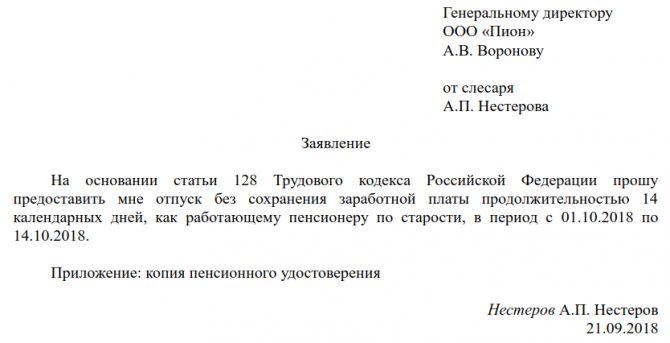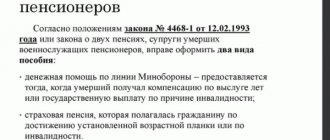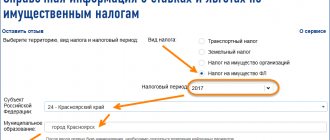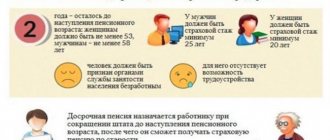The legislation of the Russian Federation provides for old-age retirement after 55 and 60 years for women and men, respectively. Employees of organizations located in the Far North and workers working in hazardous working conditions retire a little earlier on preferential lists. Many pensioners continue to work even after reaching the designated age.
In addition to old-age pensioners, there are two more categories: military pensioners and people receiving a disability pension. The relationship between an employer and an employee of retirement age remains the same, but a number of guarantees arise, provided for by the Labor Code of the Russian Federation.
Can a working pensioner take additional days off at his own expense?
Yes maybe.
The right to leave for a working pensioner without pay is one of the benefits provided to those employees who continue to work after retirement. If, after reaching retirement age, a citizen of the Russian Federation continues to work, then labor legislation fully applies to him. In addition, the Labor Code of the Russian Federation provides for certain categories of workers special guarantees and benefits. An example of such privileges is 2 weeks at their own expense for pensioners.
When answering the question whether it is possible for a working pensioner to take a vacation at his own expense, we must pay special attention to the fact that this right is defined by the Labor Code of the Russian Federation as mandatory, that is, independent of the will of the employer. In accordance with the Labor Code of the Russian Federation, any person has the right, for family reasons and other valid reasons, to receive permission to take time off for a specified period without pay. But time off based on retirement age has a certain feature: if the employer has the right to refuse any employee, then, according to Article 128 of the Labor Code of the Russian Federation, leave without pay for a pensioner must be provided upon request. In this sense, this right is preferential for a specific category of workers. But we must remember that the accounting department is obliged to recalculate the accrued wages taking into account the days not worked, so your salary will decrease in proportion to the length of the time off taken.
Additional paid leave
Cases when the next additional leave is subject to payment are listed in the legislation:
- Those working in the Far North – 24 additional days.
- Those working in areas that are legally equivalent to regions of the Far North are entitled to an additional 16 days. Workers in special climatic zones and remote areas – 8 days.
- Workers in hazardous conditions – up to 7 calendar days of additional rest. The workplace must be recognized as hazardous, according to a special study. assessment of working conditions.
- Disabled people are entitled to up to 6 days.
- Workers who have previously suffered from man-made disasters (liquidators of the Chernobyl accident) have the right to 14 days of additional paid leave.
- Workers with irregular work schedules – up to 3 days.
When are these extra weeks available?
At any convenient time. Including adding it to the next annual vacation or breaking it into several parts. It should be noted, however, that the Labor Code of the Russian Federation does not approve rules and regulations according to which additional leave without pay (including for an employee receiving an old-age pension) will be provided during the specific period specified in the employee’s application. Thus, the issue of timing is subject to agreement with the employer.
For what period is it provided?
Current legislation does not provide for any special standards for accounting for additional leave for working pensioners. Therefore, their provision is carried out on general terms for a separate category of citizens and amounts to:
- harmful and dangerous industries – 7 days;
- workers of the Far North - 24 days, and equivalent territories - 16;
- with an irregular work schedule – 3 days;
- exposed to radiation at the Chernobyl nuclear power plant - 14 days.
Based on Art. 128 of the Labor Code of the Russian Federation, the duration of leave without pay for working pensioners can be:
- WWII participant – 35 days;
- old age pensioner – 14 days;
- working disabled person – 60 days;
- all employees during the birth of a child, wedding or funeral – 5 days.
When submitting an application, you need to take into account that the specified duration is not a static, but a dynamic indicator, which depends on the category of the worker and the type of rest provided.
The duration of rest indicated above is the maximum possible number of days that company personnel can count on. In some situations, it is much more beneficial for the employee not to use all the days. This may be due to the need to earn money or accumulate work experience (only the first 14 days of vacation are counted as length of service).
How to write an application?
A working pensioner is allowed to write an application for leave at his own expense in free form. Be sure to submit it in advance, we recommend several weeks in advance. Please indicate the following in your application:
- desired start date of the holiday;
- its duration;
- the motivation for this requirement.
In this case, it is enough to present a pension certificate to motivate the request.
The employer’s consent is formalized by an order (instruction) in form No. T-6, which the employee is familiarized with and signed.
Sample application for additional leave of a pensioner

Nuances
Pensioners who work in an organization cannot be denied days for additional rest without pay, but its duration must be fourteen calendar days. So says the article.
128 Labor Code of the Russian Federation. If this type of leave is longer, this will subsequently affect the calculation of length of service, which gives the right to an annual and paid period of rest.
Therefore, as Art. 128 of the Labor Code of the Russian Federation, leave without pay should be no more than fourteen calendar days.
Provision and terms of use
Article 128 of the Labor Code of the Russian Federation establishes the obligation of the employer to provide a working pensioner, at his request, with time for rest without pay for up to 14 days a year. Failure to comply with such a requirement will be a violation of labor legislation, which, if detected by regulatory authorities, may lead to adverse consequences for the employer in the form of a fine.
However, it is not necessary to use the entire duration of additional leave at your own expense at once. If desired, it can be divided into parts, because this is not prohibited by law. Moreover, the number of such parts and their duration are also not regulated anywhere, so such fragmentation is left to the pensioner himself.
It is also worth mentioning that recalling an employee from such leave is unacceptable, because providing it is the employer’s responsibility. However, if the pensioner himself wishes, such leave can be interrupted ahead of schedule. To do this, you must first submit an application.
The remaining unused rest days can be taken again in the future , but before the end of the current working year, and the registration procedure will have to be completed again.
Procedure for granting pension leave
Additional paid leave for pensioners is provided according to the same rules as for other employees. If an elderly employee asks the employer for days off provided for by labor law, the latter has no right to refuse him. It is important that the circumstances of the provision of rest are documented.
The procedure for applying for additional leave for working pensioners is given below:
- The employee submits an application for consideration to superiors within the period established by law. The document can be designed arbitrarily. It asks for a certain number of days off. It is important to refer to the provisions of labor legislation. You also need to provide a list of attached documents;
- the employer reviews the employee’s application for a certain time, makes a decision and puts a resolution on it. In most cases, management agrees;
- Based on the application, a corresponding order is issued. It is approved by the head of the enterprise with his signature. Personnel department employees introduce this document to the pensioner. The employee confirms that he has read it with a personal signature. After this, he can go on vacation at the agreed time.
If an employer refuses to provide a pensioner with additional rest, then you need to ask him to formalize the decision in writing. If the refusal of the company administration to take leave is illegal, then the employee has every right to appeal to the Labor Inspectorate or to court to challenge it and restore justice. The law will be on the side of the pensioner.
Expert opinion
Irina Vasilyeva
Civil law expert
It is recommended to prepare the application in two copies. The first option is given to the manager for consideration, and the second, after the secretary’s note of acceptance and date, remains in the hands of the employee. This will help, if necessary, to prove the fact that the document was received within the established time frame.
Step-by-step instructions for registration
Without salary
- The HR specialist (case manager) checks the relevance of all data in the application.
- Register it in a special journal.
- Sends the application to the manager for signing.
- The leader imposes a resolution.
- The HR specialist prepares the corresponding order.
- The employee familiarizes himself with the order against his signature.
Paid holidays
The algorithm for providing additional paid days for rest is similar to the one given above. But the procedure does not end with familiarization with the order .
- The personnel employee registers the application and forwards it to the manager for consideration.
- The manager signs the application.
- An order is issued assigning additional leave.
- The HR officer, against signature, familiarizes the employee with the order and transfers it to the accounting department.
- The accountant prepares calculations and pays vacation pay.
In separate articles, we talked about the rules for obtaining additional leave for Chernobyl victims and parents who have a disabled child in their care.
Other benefits for working pensioners
Citizens who have retired but continue to work should be aware of other possible benefits provided for by labor legislation. Let's consider these types of benefits:
- denial of employment to a pensioner due to retirement age is prohibited;
- concluding a fixed-term contract with a pensioner is possible only with his consent;
- by decision and agreement with management, working pensioners may be given a shortened working day, or additional hours of rest during the working day may be allocated;
- While continuing to work and receive wages, the pensioner also has the right to pension contributions to the funded pension;
- Having made the decision to resign, the pensioner does not need to work the required two weeks, that is, the period for writing a resignation letter for him is not limited to a two-week period, he can do this immediately before the fact of dismissal;
- the organization in which a pensioner works may provide additional benefits for this category of employees, for example, a form of work that is different from the usual category of employees. They must be specified in the collective or employment agreement with the employee.
Causes

As the Labor Code of the Russian Federation 2020 states (Article 128), a pensioner operating under an agreement with an organization has the right to additional rest without pay, but only for a period of no more than fourteen days.
Expert opinion
Polyakov Kirill Yaroslavovich
Lawyer with 7 years of experience. Specialization: criminal law. Extensive experience in drafting contracts.
However, it is not necessary to indicate the reasons in the application. Because the pensioner has every right to demand from the manager to provide such leave, as indicated by the law.
All other categories of young employees not included in the list of those specified in the labor code must negotiate this with their boss.
Cash support during vacation
Additional leave is subject to payment, which is specified in the collective agreement as paid . This is done at the discretion of the organization’s management, based on the financial base. Or a vacation that is related to the working conditions of a pensioner. When calculating payment, the last year of work is taken into account, namely the working year, and not the calendar year.
If a pensioner has worked in this organization for less than a year, then the actual time worked is taken into account in the calculation period. Various payments that the employee is entitled to are added to the salary: bonus, incentive bonuses, etc. Average wages are calculated based on actual hours worked.
The average salary is calculated using the formula: Salary average = Salary/(12: 29.3) , where:
- Salary average – average salary for 1 working day.
- Salary – wages for actual time worked (including bonuses and other payments).
Next, calculate the amount of vacation pay using the formula:
Otp = ZPav X Number of days , where:
- Otp – vacation payments.
- Salary average – average wage for 1 day.
- Number of days – the number of calendar days provided for additional rest.
The amount received is not subject to income tax if the pensioner belongs to the category of participants in the Great Patriotic War, persons with disabilities and employees with a certain length of service.
Are they entitled to extra days?
The Labor Code in Article 128 clearly states the right to additional leave for working old-age pensioners (age).

In this case, the head of the organization must specify the procedure and conditions for granting such leave in the collective agreement, local acts that are approved by the trade union (or the work collective council). The same article 116 of the Labor Code of the Russian Federation states that there are citizens who are entitled to additional leave with pay, i.e. paid.
Article 116. Annual additional paid leave
Annual additional paid leave is provided to employees engaged in work with harmful and (or) dangerous working conditions, employees with a special nature of work, employees with irregular working hours, employees working in the Far North and equivalent areas, as well as in other areas. cases provided for by this Code and other federal laws.
Employers, taking into account their production and financial capabilities, can independently establish additional leaves for employees, unless otherwise provided by this Code and other federal laws.
The procedure and conditions for granting these leaves are determined by collective agreements or local regulations, which are adopted taking into account the opinion of the elected body of the primary trade union organization.
These include:
Read more: What documents are needed to verify water meters
Characteristic
Leave without pay for working pensioners is a special privilege that is granted to them in accordance with the provisions of the Labor Code. The manager has no right to refuse to provide it.
Otherwise, a citizen may apply to a judicial authority to protect his interests. In addition, due to their age, people who are retired and working need longer rest periods than other, younger employees.
This may be due to health conditions and money spent on travel to the organization. It should be noted here that this vacation cannot be more than the number of days specified in the code.
Otherwise, the annual paid vacation period will be less than it should be.
Let's sum it up
The right to receive additional annual leave is granted to Russian citizens in accordance with labor legislation. However, not in all cases the required type of leave is mandatory for employees of a particular organization. So, for example, pensioners, by law, must receive the additional days they are entitled to for rest, and use them, even though this period will not be compensated for them in the same way as regular annual leave.
However, one way or another, due to weakening health in old age and some loss of strength, pensioners really need more free time. Using it wisely, you can not only relax, but also devote time to your family, dacha, friends and favorite hobby.
Does a labor veteran have the right to rest at a time convenient for him?
Labor veterans are a category of workers whose legal status is regulated by a separate federal law. In particular, in Art. 7 of the Law “On Veterans” dated January 12, 1995 No. 5-FZ, this category of persons includes:
- Persons who have a Labor Veteran certificate.
- Persons:
- awarded orders or medals of the USSR or the Russian Federation;
- awarded honorary titles of the USSR or the Russian Federation;
- awarded with certificates of honor from the President of the Russian Federation;
- awarded with gratitude from the President of the Russian Federation;
- awarded departmental insignia for merit in labor (service) and long-term work (service) of at least 15 years in the relevant field of activity (sector of the economy) and having a labor (insurance) length of service taken into account for the assignment of a pension of at least 25 years for men and 20 years for women or the length of service required to assign a pension for long service in calendar terms.
- Persons who began working at the age of under 18 during the Great Patriotic War and who have labor (insurance) experience (for men - at least 40 years, for women - at least 35 years).
Art. 22 of the same law establishes measures for the social protection of labor veterans.
Before changes were made in 2004, this article described benefits in detail, including the rule of 30 days of annual unpaid leave , as well as the right to choose a convenient time for annual paid rest. However, in 2020, it only contained wording on the regulation of benefits for labor veterans by regional regulations.
A comment
Days without pay can be provided by the manager on his initiative or on a mandatory basis, as the law states (this applies only to certain categories of employees). In the event that a subordinate wrote a statement, but was refused by his boss, he can apply to a judicial authority to protect his interests.
Art. 128 of the Labor Code of the Russian Federation with comments from 2020 also indicates that a citizen who has been granted such a period of rest without pay can return to service at any time before its end, but only by notifying his superior in advance.
Statement
In order for the manager to provide in accordance with Art. 128 of the Labor Code of the Russian Federation, days of rest without pay for a working pensioner, the latter must contact him in writing. The application form is available in the human resources department of any organization or enterprise. In addition, it can be written in any form.
To the director of _______________ (company name)
I ask you to grant me leave without pay from ________(specify date) for ________ calendar days for family reasons.
If for some unexplained reason the boss refuses to sign the application, you can contact the organization’s dispute resolution commission, as well as the labor inspectorate and the court. Because in such a situation, the manager grossly violates the rights of the subordinate.










